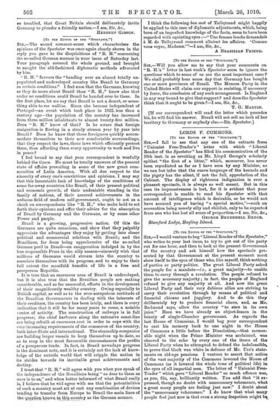[TO TEl EDITOR 01 TEl . sraerrroa."1 Sza, — The sound common-sense which
characterises the (pinions of the Spectator was once again clearly shown in the reply you gave to the disquisitions of "R. H." concerning the so-called German menace in your issue of Saturday last. Your paragraph covered the whole ground, and brought to naught the old-fashioned diplomatic methods advocated by him.
"R. H." favours the "handing over an almost totally un- populated and undeveloped country like Brazil to Germany on certain conditions." I feel sure that the Germans, knowing as they do more about Brazil than "R. H.," know also that under no conditions could Brazil be handed over to them. In the first place, let me say that Brazil is not a desert, or some- thing akin to res nullius. Since she became independent of Portugal—an event which took place in 1822, less than a century ago—the population of the country has increased from three million inhabitants to almost twenty-five million. Does "R. H." know of that ? Is he aware that foreign emigration is flowing in a steady stream year by year into Brazil P Does he know that these foreigners quickly accom- modate themselves to their new comfortable surroundings, that they respect the laws, those laws which efficiently protect them, thus affording them every opportunity to work and live in peace P
feel bound to say that your correspondent is woefully
behind the times. He must be totally unaware of the present state of affairs prevailing in some of the new great com- munities of Latin America. With all due respect to the sincerity of every one's convictions and opinions, I may say that this lamentable lack of knowledge of the conditions of some far-away countries like Brazil, of their present political and economic growth, of their undeniable standing in the family of nations, of their assured achievements in the arduous field of modern self-government, ought to ad as a check on correspondents like "R. H.," who make bold to set forth their opinions and offer their advice for the absorption
of Brazil by Germany and the Germans, or by some other Power and people.
Brazil is a growing, progressive nation. Of this the Germans are quite conscious, and show that they palpably
appreciate the advantages they enjoy by getting into closer political and commercial relations with Brazil; and the Brazilians, far from being apprehensive of the so-called German peril in Brazil—an exaggeration indulged in by the less responsible Press in the silly season—sincerely wish that millions of Germans would stream into the country to associate themselves with its progress, and to enjoy to their full extent the manifold benefits of life in a free and prosperous Republic.
It is true that an enormous area of Brazil is undeveloped,
but it is also true that the Brazilian people are making considerable, and so far successful, efforts in the development of their magnificently wealthy country. Owing especially to British capital, as well as to the ever-scrupulous rectitude of the Brazilian Governments in dealing with the interests of their creditors, the country has been lately, and there is every indication that it will be for many years to come, a notable centre of activity. The construction of railways is in full progress ; the chief harbours along the extensive coast-line are being rebuilt at enormous cost in order to cope with the ever-increasing requirements of the commerce of the country, both inter-State and international. The steamship companies are building larger vessels to keep themselves up to date, so as to reap in the most favourable circumstances the profits of a prosperous trade. In fact, in Brazil nowadays progress is the dominant note, and it is certainly not the lack of know- ledge of the outside world that will cripple the nation in its strides towards its inevitable great achievements and destiny.
I trust that "B,. H." will agree with you when you speak of the independence of the Brazilians being "as dear to them as ours is to us," and when better informed of what Brazil really is, I believe that he will agree with me that the potentialities of such a country must set at rest any combination of devices tending to transfer from E.urope to Brazil the main lines of the question known in this country as the German menace. I think the following bon mot of Talleyrand might happily be applied to this case of diplomatic adjustments, which, being born of an imperfect knowledge of the facts, seem to have been regarded with squinting eyes :—"Une femme kniche demandait M. de Talleyrand comment allaient lea affaires. Comme vous voyez, Madame.' "—I am, Sir, &c.,
A BRAZILIAN FRIEND.






































 Previous page
Previous page